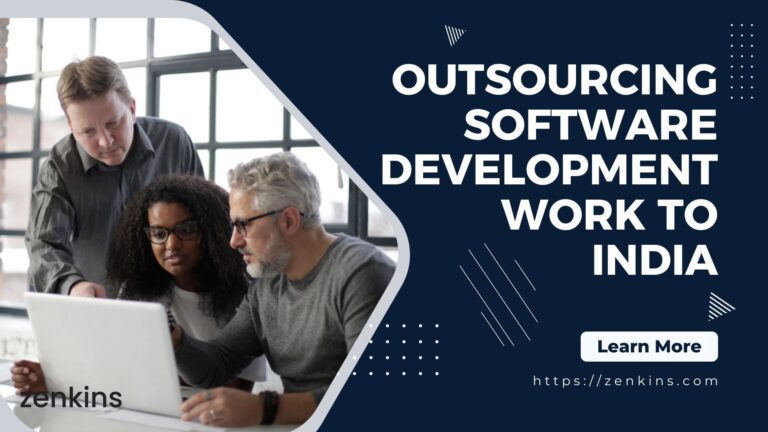How to Find a Co-Founder for My Startup: A Complete Step-by-Step Guide
Related: How to Find a CTO?
Finding the right Chief Technology Officer (CTO) or technical co-founder is crucial for the success of your startup. The role of a CTO is to oversee the development and dissemination of technology for external customers, vendors, and other clients to help improve and increase business. This comprehensive guide will walk you through every step of the process, from understanding the role of a CTO to exploring alternative solutions like partnering with a low-cost outsourcing partner such as Zenkins.
Table of Contents
1. Understanding the Role of a CTO/Co-Founder
Before you begin your search, it’s essential to understand what a CTO or technical co-founder does. The CTO is responsible for:
- Developing the technology strategy for your startup.
- Overseeing the development team.
- Ensuring the technology aligns with the company’s business goals.
- Making critical decisions regarding technology stack and architecture.
- Managing the technical budget.
In a startup, the CTO often wears many hats and is involved in both high-level strategy and day-to-day technical operations.
2. Determining Your Technical Needs
Start by assessing the technical requirements of your startup. This involves:
- Defining the core technology of your product or service.
- Understanding the skills required to build and maintain your technology.
- Identifying the challenges and opportunities in your industry.
Create a detailed job description that outlines these needs. This will help you identify the right candidates and communicate your expectations clearly.
3. Identifying Ideal Qualities in a CTO/Co-Founder
Finding the right person involves looking for a blend of technical expertise, leadership skills, and cultural fit. Key qualities to look for include:
- Technical Expertise: Deep knowledge in relevant technologies and hands-on experience.
- Leadership Skills: Ability to lead and inspire a technical team.
- Visionary Thinking: Forward-thinking with the ability to innovate.
- Cultural Fit: Alignment with your company’s values and vision.
- Problem-Solving Skills: Ability to navigate and resolve complex technical challenges.
- Communication Skills: Effective communication with both technical and non-technical stakeholders.
4. Networking and Building Relationships
Building a network in the tech community is one of the most effective ways to find a CTO or co-founder. Here are some strategies:
- Attend Industry Events: Participate in tech conferences, hackathons, and meetups.
- Join Online Communities: Engage in forums like GitHub, Stack Overflow, and LinkedIn groups.
- Leverage Your Existing Network: Ask for referrals from friends, colleagues, and mentors.
- Collaborate on Projects: Work on small projects with potential candidates to assess compatibility.
5. Leveraging Online Platforms
Several online platforms can help you find and connect with potential CTOs and co-founders. Some of the most popular ones include:
- LinkedIn: Use LinkedIn’s search and networking features to find and reach out to potential candidates.
- AngelList: A platform for startups to find co-founders, employees, and investors.
- CoFoundersLab: A matchmaking service specifically for startup founders looking for co-founders.
- FounderDating: A community of entrepreneurs looking to start new ventures together.
- GitHub: Identify talented developers by exploring open-source projects and contributions.
6. Evaluating Potential Candidates
Once you’ve identified potential candidates, the evaluation process begins. This involves:
- Reviewing Portfolios: Assess their previous work and contributions to projects.
- Checking References: Speak with former colleagues or employers to understand their work ethic and capabilities.
- Assessing Technical Skills: Conduct technical interviews or coding tests to evaluate their proficiency.
7. Conducting Effective Interviews
Interviewing potential CTOs or co-founders requires a strategic approach. Here are some tips:
- Prepare Thoroughly: Know what you’re looking for and prepare a set of questions that cover both technical and soft skills.
- Focus on Problem-Solving: Present real-world problems and assess their approach to solving them.
- Gauge Cultural Fit: Discuss your startup’s vision, values, and culture to ensure alignment.
- Evaluate Communication Skills: Ensure they can effectively communicate complex technical concepts to non-technical stakeholders.
8. Offering Attractive Compensation Packages
Attracting top talent requires offering competitive compensation packages. This can include:
- Equity: Offering a stake in the company can be highly motivating for a co-founder.
- Salary: Ensure the salary is competitive with industry standards.
- Benefits: Include benefits such as health insurance, flexible working hours, and professional development opportunities.
- Incentives: Performance-based bonuses or profit-sharing schemes can also be attractive.
9. Building a Strong Founding Team
A strong founding team is essential for the success of your startup. Ensure that:
- Roles are Clearly Defined: Each member knows their responsibilities and expectations.
- There is Mutual Respect: Trust and respect are fundamental for effective collaboration.
- You Share a Common Vision: All team members are aligned with the startup’s goals and vision.
- There is Open Communication: Foster a culture of transparency and open communication.
10. The Importance of a Strong CTO/Co-Founder
Impact on Product Development
A strong CTO or co-founder can significantly impact the product development process by ensuring that the product is built efficiently and effectively, meeting market needs and customer expectations.
Driving Innovation
A visionary CTO can drive innovation within your startup, helping you stay ahead of the competition by leveraging new technologies and methodologies.
Enhancing Credibility
Having a well-respected CTO or co-founder can enhance your startup’s credibility with investors, partners, and customers.
11. Common Challenges in Finding a CTO/Co-Founder
Skill Gaps
Identifying candidates who possess both technical expertise and leadership skills can be challenging.
Cultural Fit
Ensuring the candidate aligns with your startup’s culture and vision is crucial for long-term success.
Financial Constraints
Startups often face budget constraints, making it difficult to offer competitive salaries and equity packages.
12. Mitigating Risks When Hiring a CTO/Co-Founder
Conduct Thorough Background Checks
Ensure you conduct comprehensive background checks to verify the candidate’s credentials and past experiences.
Start with a Trial Period
Consider starting with a trial period or a probationary period to assess the candidate’s fit and performance.
Clearly Define Roles and Expectations
Establish clear roles, responsibilities, and expectations to avoid misunderstandings and conflicts down the line.
13. The Future of CTO Roles in Startups
Evolving Responsibilities
The role of a CTO is evolving with advancements in technology and changing business landscapes. Modern CTOs need to stay updated with the latest tech trends and be adaptable to new methodologies and tools.
Emerging Technologies
Highlight emerging technologies that CTOs need to be aware of, such as AI, blockchain, and IoT. Staying ahead of these trends can give startups a competitive edge.
14. Frequently Asked Questions (FAQs)
What is the difference between a CTO and a technical co-founder?
How much equity should a CTO or co-founder receive?
Can a startup succeed without a CTO?
What should I look for in a CTO candidate?
How can I determine if a CTO or co-founder is a good fit for my startup?
What are the typical responsibilities of a CTO in a startup?
How can a startup benefit from having a technical co-founder?
What are the pros and cons of hiring a full-time CTO versus partnering with an outsourced technology provider?
How can I ensure a smooth transition if I decide to bring a CTO on board later?
What are the key performance indicators (KPIs) to evaluate the effectiveness of a CTO?
How important is it for a CTO to have industry-specific experience?
15. Resources for Finding a CTO/Co-Founder
Books and Articles
- “The Lean Startup” by Eric Ries
- “Zero to One” by Peter Thiel
- “Founders at Work” by Jessica Livingston
Online Courses
- “Startup Engineering” on Coursera
- “How to Start a Startup” by Y Combinator on YouTube
- “Startup School” by Y Combinator
Mentorship and Advisory Services
- Techstars Mentorship Programs
- Y Combinator Startup School Advisors
- Local startup incubators and accelerators
16. How Zenkins Supports Startups Beyond Technology
Business Strategy Consultation
Explain how Zenkins can assist with overall business strategy, not just technology. They can help define your business goals, create strategic plans, and offer market insights.
Market Research and Analysis
Describe how Zenkins can help with market research and analysis to guide your startup’s direction. This includes identifying market opportunities, understanding customer needs, and analyzing competitors.
Continuous Improvement and Support
Highlight the ongoing support and continuous improvement services that Zenkins offers to ensure long-term success. They provide regular updates, maintenance, and optimization services to keep your technology aligned with your business growth.
17. Final Thoughts and Next Steps
Summarize the key points covered in the blog post and provide a clear call to action for startups to reach out to Zenkins for a free consultation or further information.
Finding the right CTO or co-founder is a critical step in the success of your startup. By understanding the role, identifying the right qualities, and leveraging various platforms and networks, you can increase your chances of finding the perfect match. However, if hiring a full-time CTO is not feasible, partnering with a low-cost outsource partner like Zenkins can provide the technical expertise and support you need to achieve your goals.
18. Alternatives to Hiring a CTO/Co-Founder: Zenkins as Your Technology Partner
Hiring a CTO or technical co-founder is not the only option. Partnering with a low-cost outsource partner like Zenkins can be a viable alternative. Here’s why:
Why Choose Zenkins?
Cost-Effective Solution: Hiring a full-time CTO can be expensive. Zenkins offers a cost-effective alternative without compromising on quality.
Access to a Wide Range of Skills: Zenkins has a team of experienced professionals with expertise in various technologies and industries.
Scalability: As your startup grows, Zenkins can scale its services to meet your increasing demands.
Focus on Core Business: Partnering with Zenkins allows you to focus on your core business activities while they handle the technical aspects.
Proven Track Record: Zenkins has a history of delivering successful projects for startups and established businesses alike.
Services Offered by Zenkins
Custom Software Development: Tailored solutions to meet your unique business needs.
Web Application Development: Robust, scalable web applications using the latest technologies.
Mobile App Development: Feature-rich mobile applications for iOS and Android platforms.
SaaS Product Development: Development of scalable Software as a Service products.
Enterprise Software Development: Large-scale, complex software solutions for enterprise-level clients.
Cloud Integration: Integration with cloud services for enhanced scalability and performance.
API Development and Integration: Seamless connectivity between different software systems.
DevOps and CI/CD: Streamlining development and deployment processes.
Software Testing and Quality Assurance: Ensuring your software product is reliable, secure, and bug-free.
UI/UX Design: Creating intuitive and engaging software products.
AI and ML Integration: Incorporating advanced functionalities using AI and ML technologies.
IoT Software Development: Integrating with Internet of Things (IoT) devices and platforms.
How to Get Started with Zenkins
- Contact Zenkins: Reach out to discuss your project requirements and get a free consultation.
- Define Your Needs: Work with Zenkins to define the scope and objectives of your project.
- Receive a Proposal: Get a detailed proposal outlining the project plan, timeline, and cost.
- Kick-off the Project: Once you approve the proposal, the Zenkins team will start working on your project.
- Ongoing Support: Zenkins provides continuous support and maintenance to ensure the success of your project.
19. Conclusion
Finding the right CTO or co-founder is a critical step in the success of your startup. By understanding the role, identifying the right qualities, and leveraging various platforms and networks, you can increase your chances of finding the perfect match. However, if hiring a full-time CTO is not feasible, partnering with a low-cost outsource partner like Zenkins can provide the technical expertise and support you need to achieve your goals.
Zenkins offers a comprehensive range of services tailored to meet the unique needs of startups, allowing you to focus on your core business while they handle the technical aspects. Whether you decide to hire a CTO or partner with Zenkins, the key is to ensure that you have the right technical leadership to drive your startup to success.




